- Home
- Bernice Rubens
I, Dreyfus Page 5
I, Dreyfus Read online
Page 5
Chapter 9
After I had trained as a teacher I was offered a post at a grammar school in Bristol. My parents were proud of me. I was, after all, following in their footsteps. When he graduated, Matthew stayed in Manchester and took a job in a large engineering company. But we still met up at Christmas and Easter in the old school house.
I was none too happy in Bristol. The school had earned a high and well-deserved reputation, but its headmaster was little short of a villain. He was a man of little learning, though he had sundry degrees, and he was given to violence of the ‘this hurts me more than it does you’ category, which he dealt out with sadistic pleasure. It is no exaggeration to say that I hated him. Every morning after assembly I would pass by a line of terrified boys, usually first-formers – the headmaster favoured the young – waiting to receive that punishment that would ‘hurt him more, etc.’ Sometimes I waited with them. I said nothing, but I hoped they would sense my support. Then I heard the crying from behind the door, and in spite of the head’s dictum, I knew that it was not the sound of his pain, nor his tears. During all my time at that school, apart from staff meetings, I managed to avoid him. Then, mercifully, God forgive me, he died. He was not much over fifty, but I did not pity him. He was an evil man and children were safer without him. I attended his funeral with joy.
The deputy headmaster, who was close to retirement age, took over as stand-in principal. I was already the head of the English department, and when, after about six months, the post of headmaster was officially advertised, I thought I stood a reasonable chance of stepping into the head’s unhallowed shoes. But I was only thirty years old at the time, and though I suspected that my relative youth would not be in my favour I nevertheless decided to file an application. I let it be known in the staff-room, and I noted the lack of reaction. There was neither discouragement nor dissuasion. I let it lie. I heard on the grapevine that there were half a dozen serious applications. I waited to be summoned for an interview. I waited in vain. I was not even called upon. The appointment was finally made and given to a man scarcely older than myself. I began to feel uncomfortable in my job, bewildered and humiliated. I decided to look around for a new post.
Matthew had secured a new job in London and I was anxious to move to the capital to be close to him. There was a deputy headship vacancy in Hammersmith, and I lost no time in applying. I was successful and, overjoyed, I left Bristol with little scruple, leaving only a few friends behind.
It was Christmas and time for our family reunion. Matthew arrived with a companion. Her name was Susan Cohen. An interesting name, I thought at the time. It was a name that spelt indecision. The surname gave no doubt as to its religious origins, but the Christian name was exactly that – Christian. It was as if her parents had started off on the same road as mine, but unlike them, had not gone the whole way. Susan was a beautiful girl and of a kindly and attractive disposition. She and Matthew were well suited and I was happy for them both.
‘It’s time you settled down as well,’ Susan teased me.
Until that time, I had not seriously thought about marriage. Occasionally I had taken a woman friend to dinner or a theatre. I liked women’s company, but none of them had yet stirred me beyond friendship. Now I wanted to be of equal status with Matthew. I feared that, if I continued as a bachelor, the edges of our bond might be blurred. My parents teased me too. They wanted to see us both settled down. They looked forward to grandchildren.
That Christmas was the last we spent in the village school house. At the end of the next summer term my parents retired and bought a small cottage close by. They would not be persuaded to move to London. Despite being born in a capital city, they had become village people. Possibly because of their perilous childhood, they had no longings for a big city.
I had taken a flat in Hammersmith, near my school. Matthew lived a short distance away in Notting Hill. He and Susan were making marriage plans. We saw a great deal of each other in those days and one evening, at their flat, I met Lucy, Susan’s closest friend. Over the next few weeks we were a happy four-some. One day I ventured to take Lucy out on my own and over the weeks, I grew to love her. I was wary of asking for her hand for I feared refusal. But it was she, in 1980, a leap year, who proposed to me, and all my life I shall thank her for that.
My new school was much to my liking. I intended to stay there for a while to gain administrative experience. I was ambitious. Shamefacedly so. I had my sights on a headship. But not just an ordinary headship. I wanted to rule at the finest public school in England.
In 1981, Lucy and I were married and we settled into a larger flat in Hammersmith. Matthew and Susan had married too and their first child was on the way. My parents were happily settled into their retirement and all was well with the Dreyfuses. Now when I think back on those years, I can hardly believe that there was a time in our lives without torment. Those days are gone for ever, and I must try not to think of the future.
But I do think of it. I cannot help myself. On the outside, they are working for an appeal. But they cannot hope for one without fresh evidence. I know that Matthew never ceases to collect signatures that claim a miscarriage of justice. Poor Matthew. It’s how he must spend his days. For he has no work. He was made redundant soon after my arrest. I have destroyed my whole family. No I have not. I must not think that way. For I shall start once again to believe that I am guilty. It is they who have destroyed us. Those scapegoating hunters. It’s envy and fear that has destroyed us. I had no part in it. I am tempted to name the man who hounded me. Who set out in full cry, who stalked and gave chase until I was finally gone to earth. I shall shut my eyes and write it down. Eccles. Mark Eccles.
I am not feeling too well. I think that name has stuck in my throat. I must rest now. This writing is not good for me. Yet I have come to the point when I could not bear to be without it. I wonder whether all writers have such moments. Confessional writers I mean. But none of them are Dreyfus. Yet surely in every writer’s life there must be Dreyfus moments, times of awareness of a gross injustice to their person. Do they then put down their pens as I do now and wonder where the next sentence will come from, or whether it will come at all? In moments like this I think of Lucy and the children. They will help me with the words I must write and they will tell me that they must be written, for without the words, I have no future.
Apart from my short exercise period, I have been writing most of the day. I have not even glanced at the newspaper that the governor passed on to me this morning. I shall lie on my cot and scan the headlines. Just the headlines. They will help to keep me in touch. The details and comments are at present beyond me.
At the same time, in Surrey, Matthew was scanning the same headlines. Sam in London was doing likewise. And this is what they all read. ‘MATTHEW DREYFUS LEAVES LONDON TO HIDE HIS SHAME. BROTHER GIVES UP ON BROTHER.’
Matthew, white with rage, packed his bag and hurried back to London. Sam Temple simply put his head in his hands.
Alfred Dreyfus once more picked up his pen.
Chapter 10
It’s a lie. All lies. Poor Matthew. He would never desert me. He simply needed a break from all his protest. But will it never cease? This muck-raking, these false reports, these foul innuendos? And will they dog me for the rest of my life, and after my death, will they tag my children with their infamous Dreyfus label? But I must not entertain such thoughts. I must get back to Hammersmith and my safer and happier days.
I loved teaching. Especially poetry. I found that even the most recalcitrant pupils, the bullies, the ruffians, the unreachables, even they could be touched by verse. They would learn it eagerly and recite it with such pride as if they had written it themselves. If only mathematics could be taught in rhyme. I suggested after-school drama classes, expecting few volunteers, but the response was overwhelming and in time Shakespeare no longer frightened them. I looked forward to every day at that school and the discovery of the first light in a new rogue eye.
I h
ad been at Hammersmith for five years when the headmaster was due to retire. I wanted his job desperately. I felt that that school was mine. But my failure at Bristol still left a sour aftertaste. It was clearly not my age that had hindered me, nor my teaching record and qualifications. I suspected it was some factor that I was loath to acknowledge – that a long-established traditional English grammar school was unlikely to appoint a Jewish head. But I had never advertised my faith. I had attended prayers with the rest of them. I had even knelt when it was necessary. I had kept my head uncovered and – the ultimate blasphemy – I had uttered ‘Jesus’ a thousand times. I could have fooled even a Jewish god. But somehow I must have been suspect. Perhaps they had smelt the outsider on me. I could think of no other reason for my disqualification at Bristol. I decided that I would not let it happen again, and in order to avoid it I resorted to a means of which I am so deeply ashamed that I can barely bring myself to write it down. If ever these words are published, they must appear in the tiniest of prints, so sullied am I by their matter. Indeed as I write them down, I shall close my eyes, thus pleading myself invisible, as if the story happened to someone other than myself.
There were a number of applications for the post, but as yet no shortlist had been decided upon. I felt that if only I could make that list, I would have proof that prejudice had not prevailed. I had to act quickly. I waited until the luncheon bell. Then I loitered outside the staff cloakroom until I caught sight of the headmaster on the turning of the stair. I took my time as I pushed open the door. I found several members of the staff inside. Ellis from maths was there and I chatted cheerily to him as I carefully chose my placing. Along one wall, two adjacent urinals were empty. I took the one at the end and before I could prepare myself the headmaster entered and took the one beside me. I thanked God (the Jewish One) for my good fortune. When my business was finished, I took a step backwards before adjusting my dress and in that moment, as inadvertently as possible, I exposed my uncircumcised member. It was my declaration, futile as it might have been, of belonging to their tribe, proof of my qualification for headship.
I buttoned myself with a trembling hand, and tried not to think of my grandparents. Perhaps they would have forgiven me, because I was eventually appointed to the post, but I doubt very much whether they would have been proud. The memory of that shameful incident stays with me always. It haunts my dreams. If I am guilty of anything in my life, it is of that gross trespass, not only of the sin itself, but of the fact that I profited by it. But since that time, though I haven’t advertised it, I have never denied my faith, much less contradicted it. Indeed, since my trial, I have had the urge to shout it from the rooftops. Loud and clear. But others have done that for me. Not so loud and not so clear. For English courtesy still favours the whisper and ambiguity.
I settled happily into my new post. Very gradually I introduced changes in the administration. I activated a long dormant Parent-Teacher Association and I banned any form of corporal punishment. In staff meetings I encouraged opinions, arguments and open debate. My door was always open, to staff and students alike. I did less teaching of course. Administration took up much of my time. But I continued with extra-mural drama and poetry readings and invited any parent who wished to attend. Over the years we became a community school and a model one, to the extent that we welcomed visitors from departments of education in Britain and abroad. Slowly I acquired a fine reputation, and though I belittled that fame, it did not diminish my ambition. But I had to curb my natural arrogance and avoid falling into complacency.
By now I had two children, Peter and Jean. And with Matthew’s two sons, my parents were very happy. It was a good time for all of us, and I had moments when I sensed it would not last. But I sensed it in terms of parents’ deaths, natural terms. I never envisaged a calamity of such devastation as that which now faces me. And all my family. Let me dwell on those happy times for a while with words that are easy to find, for the lexicon of my future is elusive. And besides, there are yet some years before my fall.
One summer holiday I organised a family trip to Paris. I had never been to that city, but I had always nurtured a longing to seek out my roots. My parents took a little persuasion, but their presence was essential to my purpose. And for my sake, they agreed. I understood their reluctance. Any recherche would simply illuminate the lie that they had lived since their escape, and they wanted no reminders. But they appreciated the importance of such a visit for their children and grandchildren and they accepted the invitation with grace. So together we were ten and of three generations. My parents travelled with trepidation, their two sons with curiosity, and their grandchildren with the excitement of a treat.
Our first port of call was to the Rue du Bac, where my parents had been born and had spent their short-lived childhood. Before calling at number seven, we wandered in the surrounding streets. Perhaps I was trying to shadow the steps of my grandparents as they went foraging for milk and each other. My parents registered no recall. Nor even curiosity. Their faces wore a look of pure disdain and contempt, and they dragged their steps as we approached number seven.
It was a four-storey dwelling and there were many bells attached to the front door. I pressed the one marked ‘concierge’ and I saw my mother shiver. The intercom buzzed and the front door gave way. I pushed it open and allowed our whole family to enter. I think we all had a sense of propriety about the place and I could feel a rising of common rage. On the right of the vestibule was the porter’s lodge. The door was open, and without invitation, I led my conquerors inside. The man who sat at the desk had his head down in a pile of letters and papers and did not at first notice the invasion. But when he looked up, he showed a distinct irritation at our intrusion.
‘What do you want?’ he almost shouted.
He was a man in his sixties, thin, and of wiry build. His skin was deeply pock-marked, and his half-bare arms, below his rolled-up shirt-sleeves, displayed numerous tattoos. An opened bottle of wine, half empty, stood at his elbow but there was no sign of a glass. He looked like an ageing thug who’d seen better thugging days. I noticed my father staring at him, and he seemed to grow pale. He moved towards the desk, leaned over and peered into the man’s face. ‘Émile?’ he whispered.
The porter screwed his thick eyebrows. ‘How d’you know my name?’ he said.
I detected a hint of fear in his voice. For the first time since we had arrived, my mother was roused from her indifference.
‘We lived here,’ she said. Her voice was strong and confident. ‘In the forties. During the occupation. Your mother was the concierge.’
The porter trembled and offered a lame smile. ‘What do you want?’ he asked.
‘Nothing,’ my father said. ‘We have seen enough. Come.’
It was an order to all of us. The family followed him outside. But I stayed, holding my own in front of the desk. My father said nothing. He was happy to allow me my say, whatever that say might be. But it was not words I wanted to exchange with Émile. All his life his words had been in his fists and I wasn’t about to introduce him to vocabulary. I moved around the desk. ‘Get up,’ I said.
He reached for the bottle but I tipped it on to the floor. I opened my account with a fierce punch into his pig-face. It occurred to me to tell him that the blow was for my grand-parents, but I didn’t want to personalise my attack. I thought of all those grandparents, parents and children that he had so profitably shopped, and that thought fuelled my anger and gave me strength. I was physically fit, and some years younger than my adversary, not that he put up too much of a fight. He was too frightened, too cowardly, and too utterly astonished. I punched and I pummelled him, his nose, his eyes and his lips, until he lay sprawled on the floor, bleeding profusely. Through his swollen bleeding mouth, he begged for mercy, but his plea only served to enrage me further. He sank to the floor, spread-eagled, and I waited for him to regain his breath. Then I began to kick him in his nether regions; I wanted to increase his pain. I watched him with
pleasure as he curled up on the floor, groaning his agony. I had to curb myself from killing him. So I picked up the bottle and poured the remains of the wine into his split lip, and with a final and vicious kick in his groin I took my leave.
The family were waiting outside the house. They said nothing though they must have guessed what had kept me. I had booked three nights in our hotel, and it struck me that my parents had already had enough. They wanted to go home. They wanted to be safe. The fear that had tailed their daily Parisian lives seemed to have returned. But they were mindful of their grandchildren who still regarded the venture as a holiday treat. So for the rest of our stay, we became tourists. We viewed the sights, we visited the museums, we took a trip on the Seine. My parents maintained their silence throughout, but now it was tinged with sadness. I began to regret that I had ever suggested a recherche. I thought it might have been an exercise in catharsis, a coming-to-terms with their past. Instead it had been a defilement.
It was not until we were settled on the Dover ferry that they relaxed and assumed their former cheer. But we did not talk about our visit, and until their deaths they never referred to it. But there was no doubt that the visit had affected them profoundly. Gradually they reinforced the deception that had clothed their lives since their childhoods. They went regularly to church. My mother joined the flower-arrangement group attached to the Cathedral and I am sure that they pronounced ‘Jesus’ above a whisper but equally sure that the word stuck in their throats.
Since that time I have been often to Paris, but I have avoided the Rue du Bac. Instead, I hang around the Jewish quarter, and begin to feel at home.
After that summer I returned to school with new vigour. Our A level results had placed our school at the very top of the league tables; in second place was that prestigious seat of learning where my ambitions lay. I had a full timetable. I was in much demand as a public speaker at educational conferences all over England. And I was invited to America to propagate the values of our English system. I had come a long way from my parents’ little village school, but in essence I had not moved one step distant from my French legacy. And then, one year later, I was awarded honourable recognition.

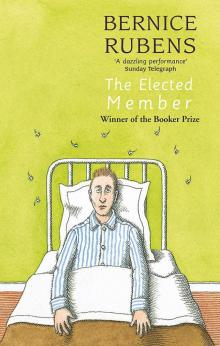 The Elected Member
The Elected Member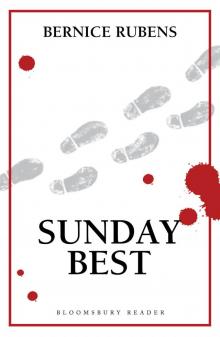 Sunday Best
Sunday Best Nine Lives
Nine Lives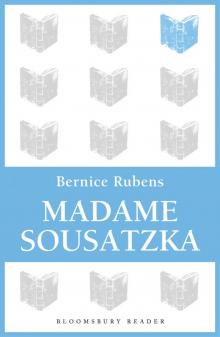 Madame Sousatzka
Madame Sousatzka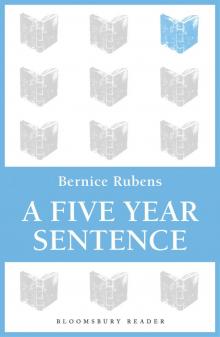 A Five Year Sentence
A Five Year Sentence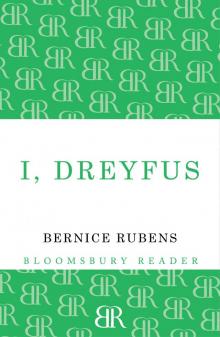 I, Dreyfus
I, Dreyfus